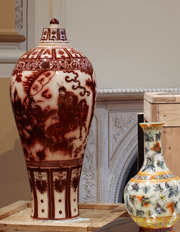
A Symposium to Coincide with the Opening of the Buncheong Exhibition
At the beginning of the Joseon Dynasty, Korean potters developed a new style - whimsical, rustic, direct, fresh, audacious, contemporary using iron-paint, stamped or inlaid designs, or simple white slip. By the sixteenth century, the buncheong ceramics had fallen out of fashion in Korea, but their influence continued to be felt strongly in Japan. Rediscovered in the 20th Century, Buncheong ware has once again achieved the interest and affection of connoisseurs and has seen as the expression of a native approach to art, genuinely Korean, fresh, and vital.
Join us for a day to study this enduring ceramic style that sprang from the celadon tradition to create an aesthetic quintessentially Korean which retains its popularity into modern times.
Confirmed Presenters
Kim Youngwon Director of National Research Institute of Korea; formerly Chief Curator at the National Museum of Korea, emeritus. Dr. Kim will give the keynote address covering an overview of Buncheong ceramics, the position of the style in the history of Korean art and the aesthetics of Buncheong ware. She will highlight the impact buncheong trade wares had on Japanese ceramics and the rediscovery of buncheong in the 20th century and the current popularity of the style.
Dr. John Duncan Professor of Pre-Modern Korean History, Director of the Center for Korean Studies, UCLA. Dr. Duncan will outline the establishment of the Joseon dynasty and how it changed the cultural picture in Korea in 14th- and 15th-century Korea.
Dr. Robert Mowry Alan J. Dworsky Curator of Chinese Art and Head of the Department of Asian Art, Arthur M. Sackler Museum; Dr. Mowry will discuss the technical aspects of Buncheong ware and the influences from the celadon tradition.
Kyungja Hwang, M.A. from New York University and Ph.D. from Dongduk Women s University, Seoul. Dr. Hwang will focus on major contemporary artists in Korea and their use of unusual components--soap and shard--to continue the Korean ceramic aesthetic tradition.
Hyonjeong Kim Han Curator of Korean Art, Asian Art Museum. HJ will moderate the day s events and give a summation of the proceedings.
Registration Policies
The Society for Asian Art's cancellation policy requires at least one week's advance written notice in order to receive a refund of registration fees. This excludes our Travel programs, which have separate cancellation policies, as well as any programs where a specific refund policy is stated on the event page. Your fees will be returned to you through a check in the mail. To cancel, please contact us.
For programs located within the Asian Art Museum, the museum entrance fee must be paid separately and is not included with your registration fee.
Please note that by registering for a program, you are giving consent to the SAA to be photographed or videoed as a participant.
